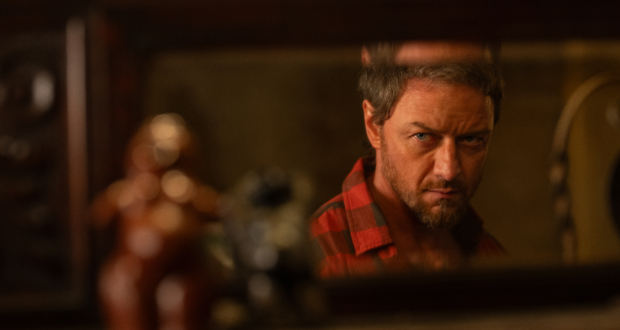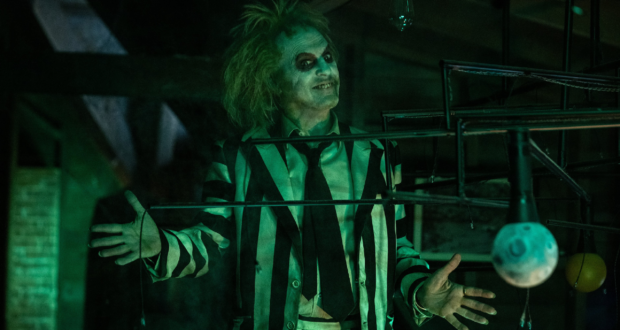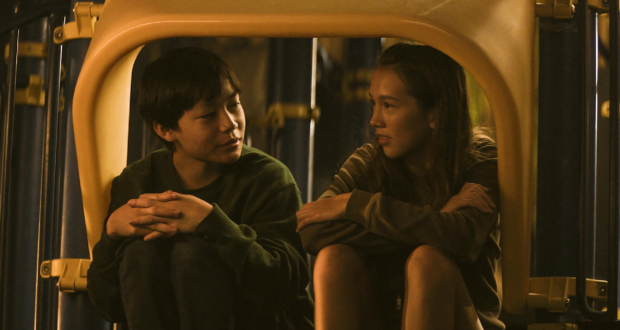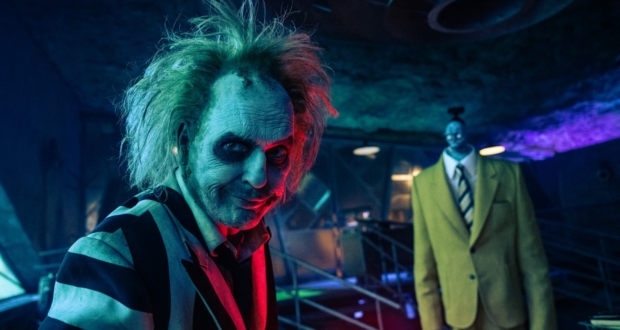 I’m not a big fan of Woody Allen, and I know that probably comes as a big surprise to anyone out there who is a movie journalist, writer or someone who really loves movies. It seems that you have to like Allen because there’s some stigma attached to his movies that means when you stand there and have a discussion about them you are instantly recognised as intelligent and accepted into a group. Well I’m sorry, I haven’t liked any of his movies.
I’m not a big fan of Woody Allen, and I know that probably comes as a big surprise to anyone out there who is a movie journalist, writer or someone who really loves movies. It seems that you have to like Allen because there’s some stigma attached to his movies that means when you stand there and have a discussion about them you are instantly recognised as intelligent and accepted into a group. Well I’m sorry, I haven’t liked any of his movies.
So to be quite honest, and no disrespect to the guys at The Cameo who invited me to this Press Screening, I went down to see Match Point because I was on holiday…and it stars Scarlett Johansson. I’m sorry. Despite a few negative points something happened while I was watching, something I hadn’t expected, I liked it.
It started from the opening moment, we were treated to titles before the movie, and I smirked. I really liked that, it was sort of a little sign that this is different from the other movies you’re watching, this harks back. The short introduction after the titles starts off the film nicely, and ties in much later on. It gives a little overview of what the film is about and how luck plays through our lives more than anything. Simply filmed and simply written, and yet it has a great impact both then, and retrospectively near the end of the film.
That was it, I started to like the movie already, and then Jonathan Rhys-Meyers (Chris Wilton) began talking and I felt my face screw up involuntarily. His acting voice was stilted and seemed very nervous, it just didn’t sit right at all and gave quite an unnatural performance through the first half of the movie where emotions are checked and played low. It had more effect than just an annoyance though and for much of that first half I was continually pulled out of the movie because of the performance, yet there were performances that grabbed me by the throat and pulled me right in.
Scarlett Johansson (Nola Rice) doesn’t start off that strong, she gives a plain but good performance, it’s really in the latter half of the film that her character turns around and becomes impassioned, giving some depth to her performance. She is undoubtedly a great actress.
Emily Mortimer, Matthew Goode, Brian Cox and Penelope Wilton provide the entire Hewett family which Wilton slowly becomes a part of, and they all provide such real and utterly believable performances.
Something I noticed about the entire cast, apart from Rhys-Meyers, is their natural performance and well delivered lines. For these performances just seemed so realistic that you are drawn into them and into the heart of this family without any difficulty. It’s even in subtle lines and gestures made throughout the movie as the family members and friends interact with each other, the dialogue is natural and flowing with characters often talking over each other as in real life. Throughout the movie there’s perhaps only one line and one scene where the feeling was dropped for me, other than Rhys-Meyers first half performance of course.
Yet when the movie progresses and the mood changes, Rhys-Meyers starts to come to life and the stilted and awkward delivery fades in favour of a confused, bored and childish man. A man filled with more emotion and passion than previously seen, and it’s here where we really begin to see the driving force of the movie and where I felt myself becoming more and more impatient and anxious as to how events would turn. In fact I wouldn’t be stretching to say that I felt a growing dread, particularly when the family were together.
Let me explain, as much as I don’t like to go over a story in the review, because if you don’t know the story then why are you looking at reviews! You should have looked at the trailer at least. Anyway, I digress.
Wilton happens into the Hewett family and becomes a part of it, entering into a rich life in all aspects of the word. He is very privileged and becomes very accustomed to it. However something is either missing from his relationship with his wife, or he’s merely wanting what he doesn’t have, whichever is the real reason he becomes a passionate affair which spirals out of control.
It’s during this affair where I felt the writing, direction and the performances pull together superbly and gave me these particular feelings. If I was to be in an affair I can imagine that it would be exactly like this (to a point in the story obviously) and you can imagine the conversations, phonecalls, confrontations, lies and hard choices being almost exactly as they are on screen. I totally believed in what I was watching at this point. When the family met together with Winton carrying on the deceit, often swapping the role of husband with lover and moving directly to a scene of a clandestine meeting, those feelings of impatience, anxiousness and dread built within me.
Somehow I engaged with his character, despite the earlier negative feelings to the performance, and felt as trapped and panicked as he did. Then when the family were together I realised I had fallen into the bond of the family, and with the fantastic performance of Mortimer as his wife, making me feel nervous and concerned about what would happen to them and how they could be hurt if the affair was made public.
There are some other very good smaller roles here from British actors that you wouldn’t have expected either, Alexander Armstrong, Steve Pemberton and Paul Keye are notable comic talents in the UK, with other roles going to strong actors such as James Nesbitt, Rupert Penry-Jones, Ewen Bremner, Colin Salmon and Zoe Telford. Some of these were surprising to see, and all gave very good performances, albeit briefly.
The ending is very interesting, and takes a very strange turn. Luckily there’s not much notice of this and gives you a nice surprise, at which point the movie does take a different turn. It’s through this ending that the opening introduction returns bringing back the notion of luck and how it might, or might not, turn against you.
A couple of scenes here nudged my belief in the character of Wilton slightly through Rhys-Meyers performance and lines, however it wasn’t enough to damage the end of the movie which is decidedly different and quite bold in it’s final moments.
Throughout the movie, at key points, Allen utilises arias as score and also scene transitions, and in the second half these moments really come into their own when you do start to feel you are watching an operatic tragedy. It’s here where I do feel that this style came through more as a storytelling device than a background score.
Overall I would recommend this movie, despite a feeling of the first half being too long and of the negative aspects Rhys-Meyers performance, it’s an engrossing and interesting movie, one which does manage to engage and affect you right till the closing scene. Performances in the film are very strong, and had me dragged right into the movie into the minds of the characters, all except Rhys-Meyers who I found struggled with his performance.
Okay, so I’m not suddenly a huge Woody Allen fan, but I do see some excellent things in this movie and I would recommend it. Perhaps I may, very selectively, look again at some of his movies.
IMDB UK movie details
My voting history on UK IMDB















